|
|
| |
| EVENTS |
|
|
> PILDAT Series on Parliamentary Budget Reforms in Pakistan
Oversight on Public Finances prime responsibility of Elected Legislators
|
|
|
| |
February 20; Oversight on public finances and budget is the prime responsibility of elected legislators at the centre and provinces and they must assert themselves to effectively discharge their responsibilities. This remained the key theme at the series of Roundtable Discussions organized by PILDAT on Parliamentary Budget Reforms in Pakistan. |
|
| |
In his introductory remarks, Mr. Ahmed Bilal Mehboob said that the roundtables are orgnised so as to celebrate a huge milestone on the road to democracy: through an amendment, moved by PML-N MNA, Ms. Anusha Rahman, and passed unanimously in the Rules of Procedures in the National Assembly of Pakistan on January 29, 2013, Standing Committees can now review departmental PSDP proposals before these are submitted to the Ministry of Finance. He said that PILDAT, which has been working to institute budget process reforms to strengthen Parliament�s role, feels more reforms are needed while there are challenges towards operationalising existing reforms.
Mr. Mehboob introduced the two speakers from India, especially invited by PILDAT to present Indian Lok Sabha and Indian State Legislatures� best practices.
He said that budget has a special significance in Parliamentary powers. While in principal and as per the statutes, budget is passed by the Parliament and Provincial Assemblies, the exercise is only just in the name. He shared that National Assembly has, on the average in the past 10 years, spent just 12 days debating and passing the most important policy document � compared to over 75-days long budget process in the Lok Sabha in neighbouring India. While ordinarily a law is referred to a Standing Committee, the Finance Bill is not one of those. He said that Budget is not a document which can be understood casually in a plenary debate and it needs a committee to analyse and debate it in-depth.
|
|
| |
Thanking the Canadian High Commission for its support to PILDAT for keeping this important debate alive, also acknowledged the support of Mr. Faisal Karim Kundi, MNA, Deputy Speaker National Assembly, Syed Naveed Qamar, MNA, Syed Khurshid Shah, MNA, Mr. Nadeem Afzal Gondal, MNA, Mr. Abdul Ghafoor Chaudhry, MNA, in addition to Ms. Anusha Rahman Khan, MNA, and Mr. Khurram Dastgir Khan, MNA, for striving to make reforms in the Parliamentary budget process in the National Assembly.
Ms. Anusha Rehman Khan, MNA (PML-N) shared problems she had to overcome for getting the amendment passed. She said that the amendment is just a beginning and much more reform is needed to put in place effective mechanism for MPs to carry out scrutiny and oversight on public finances. She added that though MPs can now put their recommendations in PSDP through Standing Committees of the National Assembly but Standing Committees still lack powers as it is only the Ministry of Finance, which is in a position either to accept or reject the recommendations in the yearly Budget. She proposed that National Assembly needs an overall reforms, particularly research associates for support of Parliamentarians. |
|
| |
Sharing his views, Mr. Abdul Ghafoor Chaudhry, MNA, Chairman National Assembly Standing Committee on Rules and Privileges, acknowledged PILDAT�s reform proposals and initiatives in strengthening Parliamentary budget process. He spoke in detail about the process the committee adopted in the passage of the amendment and shared that due to very strong opposition from the Law and Finance Ministries, the amendment had to be revised but is a welcome first step towards reforms. |
|
| |
Mr. Khurram Dastgir Khan, MNA, Chairman National Assembly Standing Committee on Commerce, traced back the history of the recently passed amendment sharing that he was the mover behind the first amendment. For an empowered Parliament, public representatives have to be able to question non-development budget as well. The culture in which bureaucracy thinks that elected legislators are a passing phenomenon and cannot be entrusted with details of statecraft and state policies must change now.
Speaking at the occasion, Mr. Nadeem Afzal Gondal, Chairman, Public Accounts Committee said that the recent amendment in the Rule of Procedure and conduct of Business in National Assembly provide powers, although a very minimum level, to the Parliamentarians to give suggestions in PSDP. The rules need more amendments to empower the Parliamentarians for an effective role on the budget. |
|
| |
Mr. Amitabh Mukhopahyay, Former Joint Secretary, Parliament of India / Former DG, Comptroller and Auditor General India explained the budget process in the Indian Parliament. He was of the view that we need innovations in our parliamentary systems as the Westminster Model of democracy provides adequately for the legislative oversight.
He said that government budget should focus on from deficit financing to balanced budgets; priority for social sector over investment in infrastructure; exclusive public or private sectors to Public-Private Partnerships in infrastructure; Concern for environment and service delivery and Transparency & accountability. He added that keeping in view of global trends the Budget should not only fiscal policy but also focussed should be given to monitory and Price Policy.
Mr. Amitabh said that Planning Commission & Finance Commission is responsible for Physical planning of public sector with massive investments in basic and heavy industries, since Ninth Plan in 1997, planning increasingly of an indicative nature Finance Commission makes recommendations regarding, the sharing of Union taxes with States, principles governing Grants-in-aid to States and transfer of resources to local bodies. |
|
| |
Finance Minister in India has a very little role in Budget Process and currently Banks are being used for recommendations on Budget.
He said that in India Borrowing is a process which can be executed only by the Executive and no other party, but Parliamentarians, by law, can fix limits for borrowing.
He added that since 1993, India has the Departmentally Related Standing Committees that look at Demand for Grants � these have practically replaced the Estimates Committee, which exists, but only reports on functioning of different government organisations. The committees consider the Demands for Grants of the concerned Ministries/Departments and report to the Houses but not suggest anything in the nature of cut motions. Theses also examine such Bills pertaining to the concerned Ministries/Departments as are referred to the Committee by the Chairman, RS or the Speaker, and report. The Committees also consider annual reports of Ministries/Departments and report. These also consider national basic long term policy documents presented to the Houses, if referred by the Chairman, Rajya Sabha or Speaker, and submit reports. |
|
| |
Mr. Gyana Ranjan Panda, Senior Research Officer, Center for Budget and Governance Accountability � CBGA, New Delhi laid down 7 best practices that in his opinion could be applied to the legislatures in the South Asia. The seven best practices included the following:
- Frequent uses of business rules to discuss budget
- Budget Transparency and Information
- Timing of the budget process
- Functioning of the committee system
- Independent Research on the programmes / govt. policies
- Establishing close working with other constitutional authorities like Supreme Audit Institutions (SAI)
- Legislators interface with CSOs
Discussing about Budget Process in Legislatures of in Indian States, Mr. Panda said the most of the states are making an efforts to ensure that budget documents are easily available with the legislators. He said that Chattisgarh, MP and Odisha have most of the budget documents related to the state budget on the website once it is presented in their respective assemblies. They present to the assemblies the status report on the implementation of the previous year budgetary proposals. He added that bringing out a separate statement on funds received from the Union Government / external agencies, which are routed through state treasury and hence are not reflected in the state budgets. They bring out a separate statement on funds on the estimated amount of revenue foregone by the State such as tax exemptions in Kerala. |
|
| |
At a similar Roundtable held at Lahore, Rana Muhammad Iqbal Khan, MPA, (PP-184, Kasur �X, PML-N), Hounourable Speaker of the Provincial Assembly of the Punjab, chaired the roundtable and felicitated Ms. Anusha Rehman Khan on the passage of the amendment. He also announced that the Punjab Assembly will also follow in the footsteps of the National Assembly of Pakistan and would also initiate an amendment to its rules on the same lines.
The Roundtable Discussion was attended by a large number of Parliamentarians from different political parties, Civil Society Representatives, Media representatives and Parliamentary Staff. PILDAT has prepared a Background paper on the reforming Parliamentary Budget Process in Pakistan. This Roundtable Discussion was held with support of the Canadian High Commission, Islamabad under the project Roundtable Discussions on Reforming Parliamentary Budget Process. |
|
| |
|
|
| |
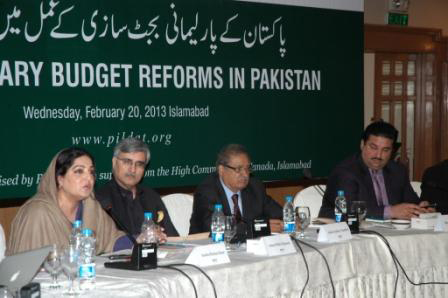
|
|
| |
|
|
| |
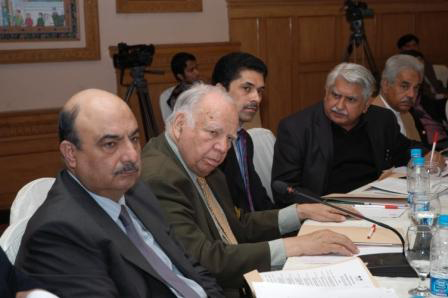
|
|
| |
|
|
| |
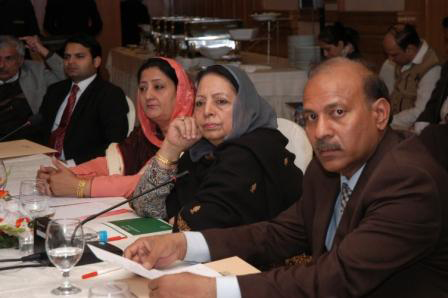
|
|
| |
|
|
| |
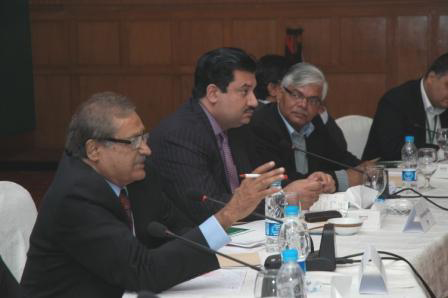
|
|
| |
|
|
| |
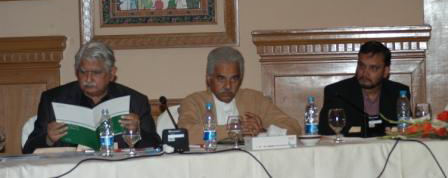
|
|
| |
|
|
| |
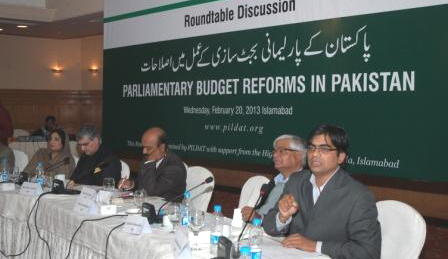
|
|
| |
|
|
| |
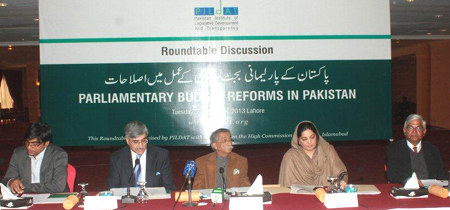
|
|
| |
|
|
| |
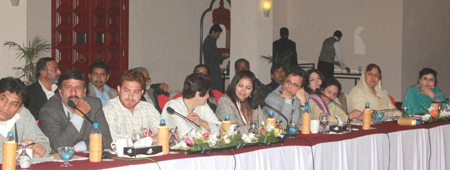
|
|
| |
|
|
| |

|
|
|
|
|
|
|
|
|